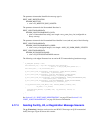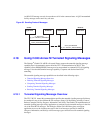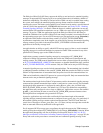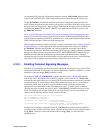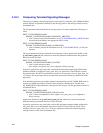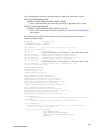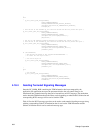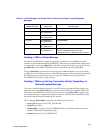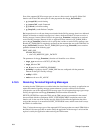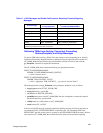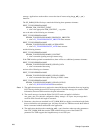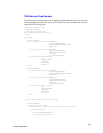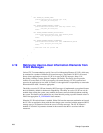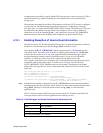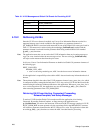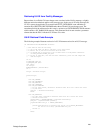254
Dialogic Corporation
Four of the supported H.225 message types are sent as a direct result of a specific Global Call
function call for the CRN and require no other preparation after the gc_SetUserInfo( ):
• gc_AcceptCall( ) sends Alerting
• gc_AnswerCall( ) sends Connected
• gc_CallAck( ) sends Proceeding
• gc_DropCall( ) sends Release Complete
But because there is no call state change associated with the Facility message, there is no dedicated
Global Call function to send this message (nor is there a dedicated Global Call event to receive a
Facility message). Instead, Global Call uses the generic gc_Extension( ) mechanism to send and
receive Facility messages. Because of this, an application must construct a GC_PARM_BLK to
pass to the gc_Extension( ) function call to specify that it wishes to send a Facility message; note
that this GC_PARM_BLK is completely separate from the structure that sets up the TSM itself via
the gc_SetUserInfo( ) function. The GC_PARM_BLK passed to gc_Extension( ) must contain a
parameter element of the following type:
IPSET_MSG_Q931
IPPARM_MSGTYPE
• value = IP_MSGTYPE_Q931_FACILITY
The parameters for the gc_Extension( ) function call should be set as follows:
• target_type must be set to GCTGT_GCLIB_CRN
• target_id is the CRN
• ext_id must be set to IPEXTID_SENDMSG
• parmblkp is a pointer to the GC_PARM_BLK that was configured with the parameter
element for the Q.931 Facility message
• retblkp is NULL
• mode must be set to EV_ASYNC
4.18.5 Receiving Tunneled Signaling Messages
Assuming that the TSM feature was enabled when the virtual board was started, an application can
request the tunneled signaling message content whenever it receives a Global Call event that
corresponds to one of the supported H.225 message types. For all supported message types except
Facility, the application uses the gc_Extension( ) function and the extension ID
IPEXTID_GETINFO to request the TSM, and the TSM contents are transmitted in the external
data associated with the asynchronous GCEV_EXTENSIONCMPLT completion event for the
function call. In the case of the Facility message, Global Call notifies the application that it has
received the message via an unsolicited GCEV_EXTENSION event, and this event itself conveys
the TSM in its external data.
Table 17 relates the message types of the supported H.225 messages that can contain TSM fields to
the Global Call event types that are used to notify the application of the message’s arrival and the
tag that is used by the application when retrieving the TSM content.



